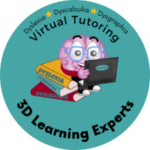Reading stories to children with Dyslexia, Dysgraphia, and Dyscalculia can be a powerful tool for enhancing their learning experience and expanding their vocabulary.
This approach not only helps them keep pace with their peers but also instills a deeper understanding of the lessons. On September 25, Math Storytelling Day celebrates the powerful impact of storytelling on neurodiverse kids.
Storybooks offer your neurodiverse children a powerful tool for learning math through multisensory experiences. By integrating mathematical concepts into engaging narratives, these books make math more accessible and relatable, accommodating various learning styles and fostering a deeper understanding of math in real-life contexts. “A Little SPOT Learns Math With Lemons (Inspire to Create A Better You!)” aligns with the entrepreneurial spirit often associated with Dyslexia, Dysgraphia and Dyscalculia by illustrating the practical value of math, this book can engage your children who may not naturally gravitate toward math-based subjects.
When individuals recognize the practicality and significance of mathematical concepts, they become more motivated to learn them. One example is how my youngest child learned to tell time because they weren’t allowed to watch TV until a certain time of day and he wanted to know when it was time for him to be able to watch TV.
Furthermore, math storytelling serves as a valuable tool for teaching children how to count money and understand the basics of finance. It can also be applied to nurture budding entrepreneurs. For instance, children interested in running a lemonade stand or selling homemade cookies can learn about fractions by adjusting recipe quantities. This kind of learning is not only educational, it is also lots of fun.
To explore more insights and resources on supporting neurodiverse students through multisensory strategies, subscribe to the 3D Learning Experts YouTube channel at youtube.com/@3DLearningExperts. If you are interested in personalized virtual tutoring, schedule a free consultation at 3DLearningExperts.com/consult. Lastly, visit 3DLearningExperts.com for a wealth of other valuable resources.
Remember, as parents you can be the champion for your child’s learning journey. With the right tools and approach, we can unlock your children’s full potential and help them thrive academically and beyond.
When individuals recognize the practicality and significance of mathematical concepts, they become more motivated to learn them. One example is how my youngest child learned to tell time because they weren’t allowed to watch TV until a certain time of day and he wanted to know when it was time for him to be able to watch TV.
Furthermore, math storytelling serves as a valuable tool for teaching children how to count money and understand the basics of finance. It can also be applied to nurture budding entrepreneurs. For instance, children interested in running a lemonade stand or selling homemade cookies can learn about fractions by adjusting recipe quantities. This kind of learning is not only educational, it is also lots of fun.
To explore more insights and resources on supporting neurodiverse students through multisensory strategies, subscribe to the 3D Learning Experts YouTube channel at youtube.com/@3DLearningExperts. If you are interested in personalized virtual tutoring, schedule a free consultation at 3DLearningExperts.com/consult. Lastly, visit 3DLearningExperts.com for a wealth of other valuable resources.
Remember, as parents you can be the champion for your child’s learning journey. With the right tools and approach, we can unlock your children’s full potential and help them thrive academically and beyond.

